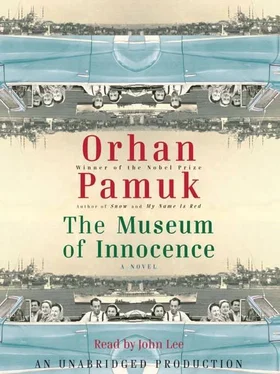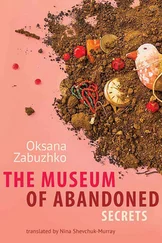At the same college there was an “administrator”-in his thirties, his hair always slick with brilliantine, edgy, obnoxious, and taciturn. He was ever finding excuses to call Füsun to his office, as in “Your identity papers are not complete,” or “One of your answer sheets is missing,” and once she was there, he’d begin discussing the meaning of life, the beauty of Istanbul, and the poems he had published until, seeing that Füsun was giving him not a word of encouragement, he would turn his back on her, gazing out the window, and he would hiss, “You may leave.”
She would not even discuss the hordes-a woman in one instance-who came to the Şanzelize Boutique and fell in love with her on sight, and went on to buy loads of dresses, accessories, and trinkets from Şenay Hanım. Naturally, I pressed her for more details, and only to placate my curiosity, passing for concern, did she agree to talk about the most ridiculous one, a man in his fifties, short, fat as a jar, with a brush mustache, but stylish and rich. He would chat with Şenay Hanım, now and again pushing long French sentences out of his little mouth, and when he left the shop his cloud of perfume would linger for some time, upsetting Lemon the canary!
As for the suitors found by her mother through a matchmaker (supposedly without Füsun’s knowing) there was one man she’d liked, who had been more interested in her than in marriage; she’d gone out with him a few times, liked him, and kissed him. Last year, during a music competition among many schools at the Sports Arena, she’d met a Robert College boy who’d fallen head over heels in love with her. He’d meet her at the school gate, and every day they’d leave together, and they’d kissed two or three times. Hilmi the Bastard, however, despite a flurry of dates, she’d not even kissed, because his sole aim in life seemed to be getting girls into bed. She’d felt close to Hakan Serinkan, the beauty contest emcee, not because he was famous, but because, in this place where everyone was conspiring backstage and being openly unfair to her, he’d gone out of his way to be gentle and kind; and because when it came time for the culture and intelligence questions that made the other girls so nervous, he’d whispered them to her backstage in advance, along with the answers. But later, when this old-style crooner had made insistent phone calls to the house, she’d refused to answer, and, anyway, her mother didn’t approve. Rightfully inferring jealousy-though she thought it had to do with the singer’s fame-she told me tenderly (but with obvious pleasure) that she had not been in love with anyone since the age of sixteen, and then she made a pronouncement that shocks me still. Although she, like most girls, enjoyed the perpetual celebration of love in magazines and television and songs, she didn’t regard the subject fit for idle talk, and was convinced that people exaggerated their feelings just to appear superior. For her, love was something to which one devoted one’s entire being at the risk of everything. But this happened only once in a lifetime.
“Have you ever felt anything close to this?” I asked, as I lay down beside her on the bed.
“Not really,” she said, but then she thought a bit and with a reserve born of willful scrupulousness, she told me about someone.
There was a man so madly and obsessively in love with her that she had thought she could love him back-he was rich, handsome, a businessman, and “married, of course.” In the evenings when she left the shop he would pick her up in his Mustang at the corner of Akkavak Street. They would go to that place next to the Dolmabahçe Clock Tower where people parked and drank tea and looked at the Bosphorus or to that empty lot in front of the Sports Arena, and as they sat there in the dark, and sometimes in the rain, they would kiss for a long time, and then, forgetting his circumstances, this thirty-five-year-old man would ask her to marry him. I could smile over this man’s predicament, suppressing my jealousy, much as Füsun intended, even as she told me what kind of car he had, what sort of work he did, and how lovely his large green eyes were; but when Füsun told me his name, I was flooded by an envy that confounded me. This man whom she intimately called Turgay, who had made his fortune in textiles, was a “business associate” and family friend of my father, my brother, and me. I often saw this tall, handsome, ostentatiously hale and hearty man strolling around Nişantaşı with his wife and children, a contented family man. Could my regard for him-as a committed family man, and an honest and hardworking businessman-have somehow inspired this great jealous surge? Füsun recounted how this man had come to the Şanzelize for months on end to “catch” her, and because Şenay Hanım was wise to him, he’d been obliged almost to buy out the entire shop.
Şenay Hanım had pressured her, saying, “Don’t cause any heartbreak to my kind customer,” and so Füsun had accepted his presents, and then later, when she was sure of his affections, she had started to meet with him “out of curiosity,” and even felt “strangely close” to him. One snowy day, at Şenay Hanım’s insistence, she’d gone with this man to “help” a friend who’d opened up a boutique in Bebek; on the way back, they’d stopped in Ortaköy for a bite to eat, and after he’d drunk a few too many rakıs , “Turgay Bey the playboy factory-owner” began to press her to go with him to his garçonnière in a backstreet in Şişli, to “drink some coffee.” When Füsun turned him down, that “elegant, sensitive man,” losing all sense of proportion, said, “I’d buy you anything!” Thus rebuffed he then drove the Mustang to empty lots and backstreets trying to kiss her like before, until, with Füsun refusing his advances, he’d tried to “possess” her by force. “And all the while he was saying that he was going to give me money,” said Füsun. “The next evening, when the shop closed, I didn’t meet him. The day after that, he came to the shop, and either he’d forgotten what he’d done or he chose not to remember. He pleaded with me ardently, even leaving a Matchbox Mustang for me with Şenay Hanım. But I never got into that Mustang again. In retrospect, I should have been stern and told him never to come back again. But he was so in love with me, like a child, really; he was prepared to forget any rejection in the hope of having his love returned, and that moved me, so I couldn’t say it. He would come to the shop every day, buying so much and making Şenay Hanım very happy, and if he got me alone for a moment in some corner, his great green eyes almost wet, he would plead with me, saying, ‘Can’t we just go back to the way we were? I can pick you up every evening. We can drive around in the car. I don’t want anything else.’ After I met you, I started hiding in the back room every time he visited the shop. Now he doesn’t come round so often.”
“Those times last winter when you kissed him in the car, why didn’t you go further?”
“I wasn’t eighteen years old yet,” said Füsun, frowning gravely. “I turned eighteen two weeks before you and I met at the shop-on April twelfth.”
If the intrinsic evidence of love is to have one’s lover or the object of one’s affections in mind at all times, then I was truly on the verge of falling in love with Füsun. But inside me was a coolheaded rationalist saying my inability to stop thinking about Füsun was because of all those other men. When it occurred to me that jealousy might be an even more definitive sign of love, my reason (however frantic) concluded that this was merely a transitory manifestation. Indeed, after a day or two, I would assimilate Füsun’s catalog of the “other men” who had enjoyed her kisses, and even feel some contempt for those who had failed to compel her to go further. But when we made love that day, rather than tumbling into the usual childish bliss, in which playful curiosity mingled with exuberance, I found myself in the grip of what the newspapers call the urge to “master her,” and making my desires plain with ever harsher force, I was surprised by my own behavior.
Читать дальше












